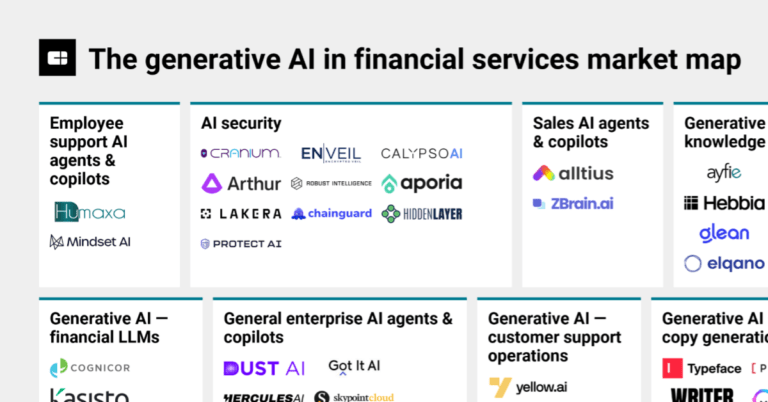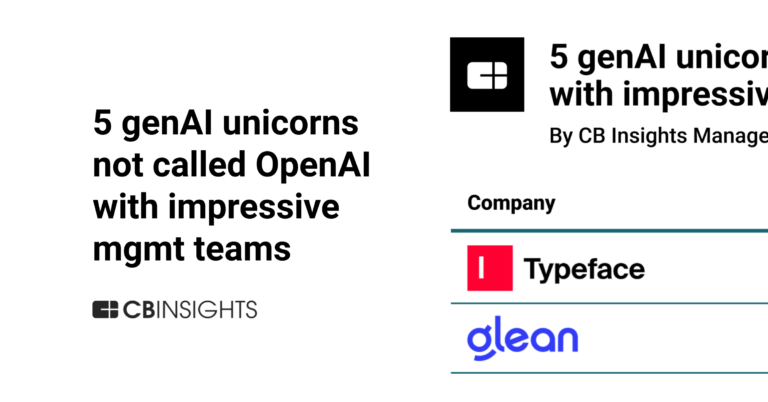
Typeface
Founded Year
2022Stage
Series B | AliveTotal Raised
$205MValuation
$0000Last Raised
$140M | 2 yrs agoMosaic Score The Mosaic Score is an algorithm that measures the overall financial health and market potential of private companies.
+6 points in the past 30 days
About Typeface
Typeface is a generative AI platform that specializes in personalized content creation for the enterprise sector. The company offers a suite of tools that streamline the content creation process, enabling businesses to produce on-brand content at an accelerated pace. Typeface primarily serves sectors that require robust content marketing strategies, such as email marketing, advertising, SEO, and eCommerce. Typeface was formerly known as Cortex6. It was founded in 2022 and is based in Palo Alto, California.
Loading...
ESPs containing Typeface
The ESP matrix leverages data and analyst insight to identify and rank leading companies in a given technology landscape.
The generative AI — sales & outreach market helps businesses maximize creativity and productivity in their sales and outreach efforts. These solutions leverage machine learning techniques to generate personalized sales content, such as email templates, scripts, and proposals, tailored to individual prospects or customers. The technology includes AI copywriting tools, real-time meeting guidance, an…
Typeface named as Challenger among 15 other companies, including Microsoft, Salesforce, and Outreach.
Loading...
Research containing Typeface
Get data-driven expert analysis from the CB Insights Intelligence Unit.
CB Insights Intelligence Analysts have mentioned Typeface in 8 CB Insights research briefs, most recently on Nov 7, 2024.
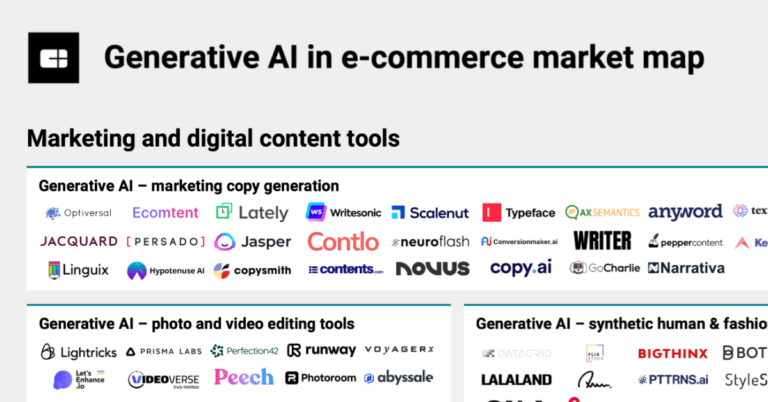
Oct 17, 2024
The generative AI for e-commerce market map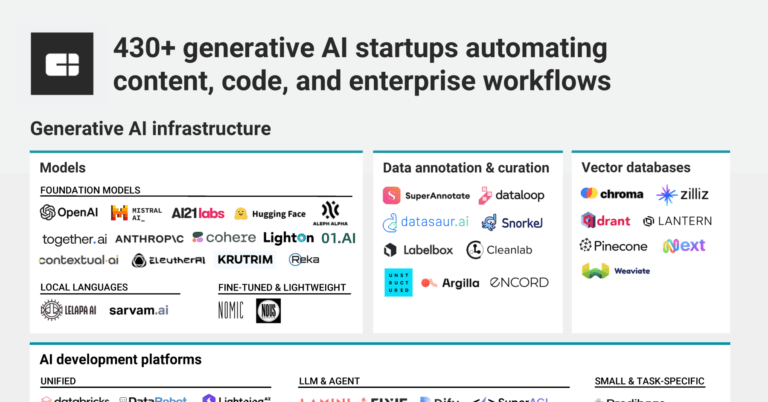
May 24, 2024
The generative AI market map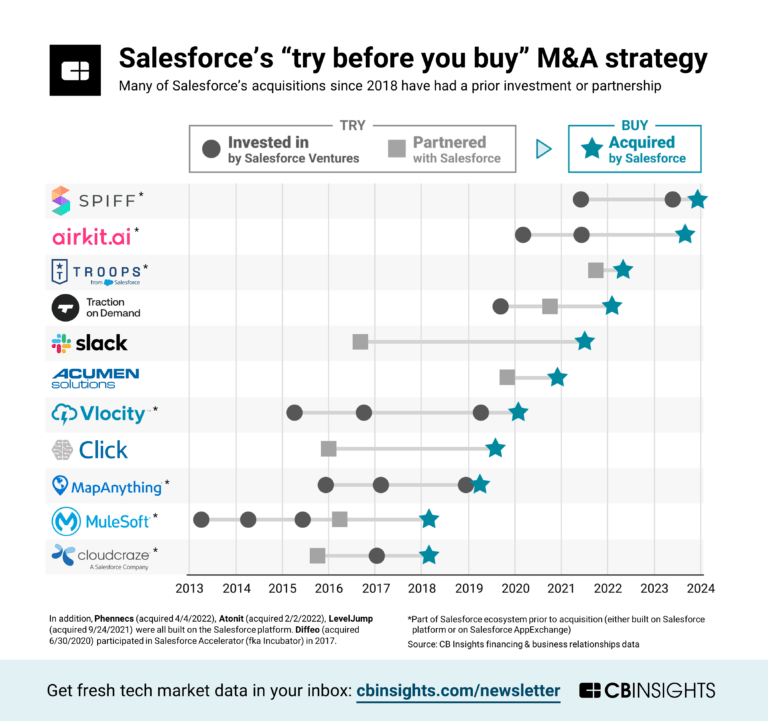
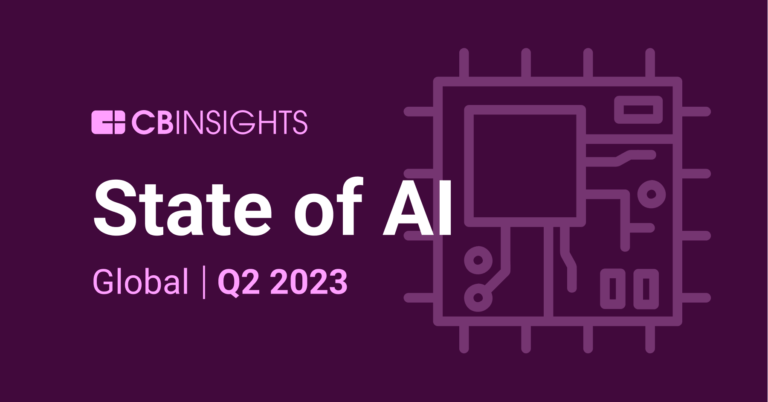
Aug 16, 2023 report
State of AI Q2’23 Report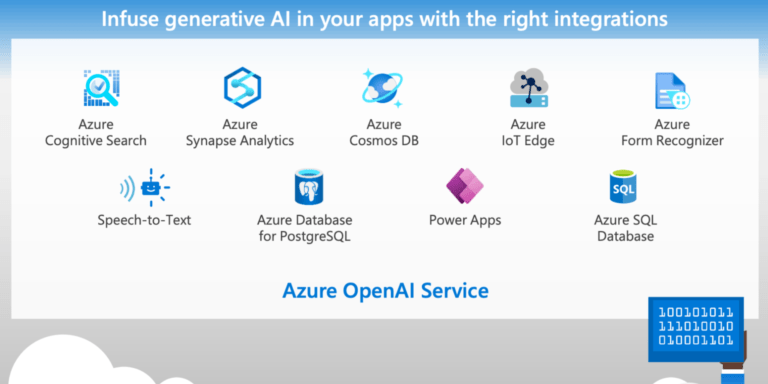
Expert Collections containing Typeface
Expert Collections are analyst-curated lists that highlight the companies you need to know in the most important technology spaces.
Typeface is included in 5 Expert Collections, including Unicorns- Billion Dollar Startups.
Unicorns- Billion Dollar Startups
1,276 items
Digital Content & Synthetic Media
1,525 items
The Synthetic Media collection includes companies that use artificial intelligence to generate, edit, or enable digital content under all forms, including images, videos, audio, and text, among others.
Generative AI
2,314 items
Companies working on generative AI applications and infrastructure.
Artificial Intelligence
10,047 items
NRF Big Show 2025: Exhibitors
959 items
Typeface Patents
Typeface has filed 5 patents.
The 3 most popular patent topics include:
- promotion and marketing communications
- rotating disc computer storage media
- artificial neural networks

Application Date | Grant Date | Title | Related Topics | Status |
|---|---|---|---|---|
7/25/2024 | 2/4/2025 | Rotating disc computer storage media, Diagrams, Promotion and marketing communications, Combat flight simulators, Social networking services | Grant |
Application Date | 7/25/2024 |
|---|---|
Grant Date | 2/4/2025 |
Title | |
Related Topics | Rotating disc computer storage media, Diagrams, Promotion and marketing communications, Combat flight simulators, Social networking services |
Status | Grant |
Latest Typeface News
May 16, 2025
I write about the economics of AI. Follow Author Share Comment Forget big teams and bigger models. The AI startups growing fastest seem to be solving one clear ... More problem — and doing it really well. getty The AI boom has largely been defined by size — large models, huge funding rounds, and teams numbering in the hundreds. But a new trend is emerging — one where lean, focused AI startups are thriving by mastering specific use cases. Take AiHello for instance. Founded by Saif Elhager and Ganesh Krishnan, the 40-person startup has built a profitable AI platform focused solely on Amazon advertising. With no outside funding, they’ve grown to seven-figure annual revenues and continue to double each year. Their approach: build for a well-defined problem and automate everything possible. “We just built a business around the problems we were most familiar with and sold it to people we knew would need it,” said Elhager in an interview. “Instead of trying to look for something that sounded impressive.” This strategy stands in contrast to the scale-first model dominating much of the AI industry today. Rather than building large, generalized tools and searching for product-market fit, Elhager told me that AiHello focused from day one on a single platform, a single use case and a set of customers they understood deeply. And that, according to him, has made all the difference for their company. The Case For Domain-First AI According to McKinsey’s 2024 State of AI report , 65% of businesses now use generative AI in at least one function — double the rate from 2023. Despite such a commendable figure, the most consistent revenue gains are showing up not in flashy creative tools, but in targeted applications like inventory management, operations and marketing optimization — domains where specialized AI solutions thrive. MORE FOR YOU This shift from broad AI ambition to narrow execution that’s hyper-focused on a specific domain mirrors what AiHello is doing in ecommerce. The company’s laser focus on Amazon’s ad ecosystem allows it to improve its models continuously and respond directly to customer needs. Saif Elhager- Cofounder, AiHello AiHello “When you have a more focused number of use cases, you can also spend a lot more time making sure the AI performs well,” Elhager explained. This level of precision isn’t possible in generalized platforms trying to cover dozens of workflows at once. And more industry leaders are now echoing the sentiment that the path to lasting impact isn't scale but specificity. As Sarah Guo noted in a previous edition of the No Priors podcast, which covered AI investment hype , foundation models, regulation and more, “there is real opportunity for vertical specific models where you can imagine that control for either compliance or safety, or just performance makes sense.” The Economics Of Staying Lean While many AI startups spend aggressively on sales, compute and hiring, AiHello went in the opposite direction. The team relies heavily on internal automation, offshores most of its talent and keeps its operating costs low. “Our payroll is 80% lower than usual,” noted Elhager. “We spend very little on sales or marketing, and that’s kept us profitable from day one.” Capital efficiency has become a growing concern in AI, especially as funding conditions tighten. Industry veteran Andrew Ng has also noted this trend, arguing that AI’s real value lies in embedding it into specific workflows — not just building general-purpose tools. “AI won’t replace human workers,” Ng said in a March 2024 talk, “but people that use it will replace people that don’t.” That distinction favors platforms like AiHello, where AI works quietly in the background — cutting costs, saving time and letting the business run smarter. Building On What Works Already Rather than trying to compete with Amazon or build a new ecommerce stack from scratch, AiHello built its tools directly within the existing system. “Building on an existing platform and going to market with an obvious ICP is much quicker and less capital-intensive,” said Elhager. “If your goal is to build a 7–8 figure business, then this is one of the higher probability ways of doing that.” It’s a reminder that not every breakthrough requires reinvention. Sometimes, the smartest move is to enhance what already works. The Next Wave AiHello isn’t the only one taking this path. Other startups like Rebuy — which helps Shopify merchants personalize shopping experiences using AI — Typeface which generates on-brand content for marketing teams — and Adept — which builds AI agents that can take actions across enterprise software tools — are succeeding by solving specific problems inside defined ecosystems. “Having limited headcount means we have to focus on only 1–2 things that matter,” said Elhager. “That’s paradoxically a faster way to make progress.” In a market already flooded with general-purpose AI pitches and bloated burn rates, the future may belong to companies that stay small, move fast and go deep rather than wide.
Typeface Frequently Asked Questions (FAQ)
When was Typeface founded?
Typeface was founded in 2022.
Where is Typeface's headquarters?
Typeface's headquarters is located at 260 S California Ave, Palo Alto.
What is Typeface's latest funding round?
Typeface's latest funding round is Series B.
How much did Typeface raise?
Typeface raised a total of $205M.
Who are the investors of Typeface?
Investors of Typeface include Menlo Ventures, Lightspeed Venture Partners, Google Ventures, M12, Salesforce Ventures and 3 more.
Who are Typeface's competitors?
Competitors of Typeface include Optiversal and 5 more.
Loading...
Compare Typeface to Competitors

Lumen5 is a video creation platform that allows teams to produce social media content. The company offers tools that facilitate the video creation process, allowing users to focus on storytelling while technology assists in implementation. Lumen5 serves enterprise brands, organizations, and creatives looking to enhance their marketing efforts with video content. It is based in Vancouver, British Columbia.

Jasper operates as an artificial intelligence (AI) content creation platform. The company's main services include the creation of on-brand AI-assisted content, language translation, and the generation of marketing campaigns. It is primarily used in the marketing and advertising industry. Jasper was formerly known as Proof Technologies. It was founded in 2020 and is based in Austin, Texas.

Smartly.io is an advertising technology company that provides AI-powered advertising solutions. The company offers a platform that integrates media buying, creative automation, and intelligence. Smartly.io serves agencies, brand marketing teams, performance teams, and creative teams across various sectors. It was founded in 2013 and is based in Helsinki, Finland.

Biteable provides a platform for individuals and teams to create video content. Its services include a video maker with templates, branding customization, and collaborative editing tools to assist in video creation for different business sectors, such as marketing, sales, human resources, education, and operations. It is based in West Hobart, Tasmania.

ContentStudio is a unified social media management platform in the digital marketing industry. The company offers a suite of tools for planning, scheduling, discovering, and analyzing social media content, as well as engaging with audiences. ContentStudio primarily serves agencies, brands, and marketers across various sectors. It was founded in 2017 and is based in Claymont, Delaware.
Tofu focuses on providing artificial intelligence solutions in the business-to-business (B2B) marketing sector. The company offers tools that enable marketing teams to create personalized content for various channels and to scale their marketing campaigns. It serves the B2B marketing industry. It was founded in 2023 and is based in San Francisco, California.
Loading...

